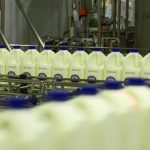
The March 17, 2020, letter asks members to voluntarily reduce milk production to the best of their ability, saying the “extreme nature of the coronavirus situation and the impact on the economy” could compromise the ability to pick up and process farmers’ milk.
“We also need to be prepared for scenarios that would require our members to dump milk on member farms, ship milk to digestors, or dispose of in some other manner,” because of the coronavirus situation the letter stated.
According to the letter, Foremost Farms offices remained opened, as of the date of the letter, and employees who can work remotely were doing so, but the they are “preparing for both potential reductions in employees available to work in Foremost plants and customer limitations to process milk in their plants.” While it was business as usual last week, Foremost anticipates “disruptions that could abruptly change the normal course of business.”
Foremost field representatives are set to follow up with farmers by March 27 to find out what actions each are taking to reduce supply.
Kenosha County farmer Dave Kirchner, who milks about 50 cows, said his production has already decreased because of feed quality due to weather challenges farmers faced last year. The day before Thanksgiving 2019 he sold 42 head of young stock to stretch the feed supply.
“So as far as the dairy asking concessions, I made my sacrifices already as far as I’m concerned,” said Kirchner. “It’s up to them to figure out how to make this work.”
Kirchner first heard the news from one of his nutritionists in a group text that farmers would be receiving a letter regarding avenues to reduce production. With the letter coming out several days after national announcements regarding the seriousness of the coronavirus, Kirchner said he can’t help but wonder if Foremost is using the pandemic as a scapegoat for “reducing their payables.”
According to Kirchner, Foremost lost $19 million in the first half of 2019. This came after selling the Rothschild plant in 2018 and laying off 110 employees. In July 2019, Foremost Farms CEO Michael Doyle announced his retirement at the end of the year and Greg Schlafer took over, reducing more than 70 jobs, many of them white collar positions, Kirchner said.
“We feel at this uncertain time in our nation, cutting milk supply is not a good idea,” Judy Kirchner said in an email.
Foremost Farms also asked farmers to consider “a little extra culling of herds, or drying off some cows early,” as options as they “assess this very dynamic and unique market environment.”
The Foremost letter continued, “We will advise back if additional actions are necessary to support the coop through this unprecedented set of events.”
Multiple calls by the Wisconsin State Farmer to Foremost Farms were not returned.
As Foremost Farms monitors the coronavirus situation, the letter said they would be working closely with the National Milk Producers Federation (NMPF) to “ensure that cooperatives are managing this situation with a unified approach.”
According to a March 24 press release from NMPF, dairy farmers can “expect to face price declines and unstable demand over the next several months, as joblessness rises, schools remain closed and farm and dairy processing operations face unprecedented logistical challenges.”
On March 24, NMPF President Jim Mulhern sent a letter to U.S. Department of Agriculture Secretary Sonny Perdue saying during the past two weeks, NMPF has worked to assure consumers a safe and abundant U. S. dairy supply but they are closely “monitoring market developments negatively impacting the dairy sector at various steps in the supply chain, from farm to the consumer.”
Among several issues outlined in the letter, Mulhern said, “Some dairy farmers or processing plants may be forced to dispose of milk due to transportation or logistical disruptions, or if demand from domestic or international markets diminishes.”
The letter to Purdue outlined several remedies to help dairy farmers during the coronavirus crisis including “compensation for milk disposal, a real possibility as logistical challenges on the farm and at manufacturing plants may create severe disruptions,” the NMPF press release stated.
NMPF resources for the dairy community can be found at nmpf.org/coronavirus/
Carol Spaeth-Bauer at 262-875-9490 or carol.spaeth-bauer@jrn.com. Follow her on Twitter at cspaethbauer or Facebook at https://www.facebook.com/carol.spaethbauer.
























